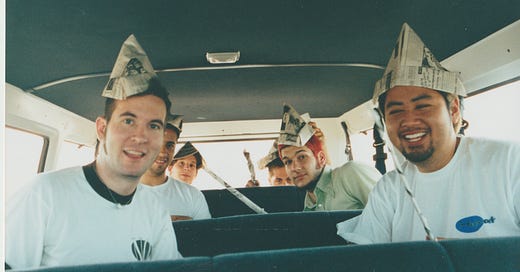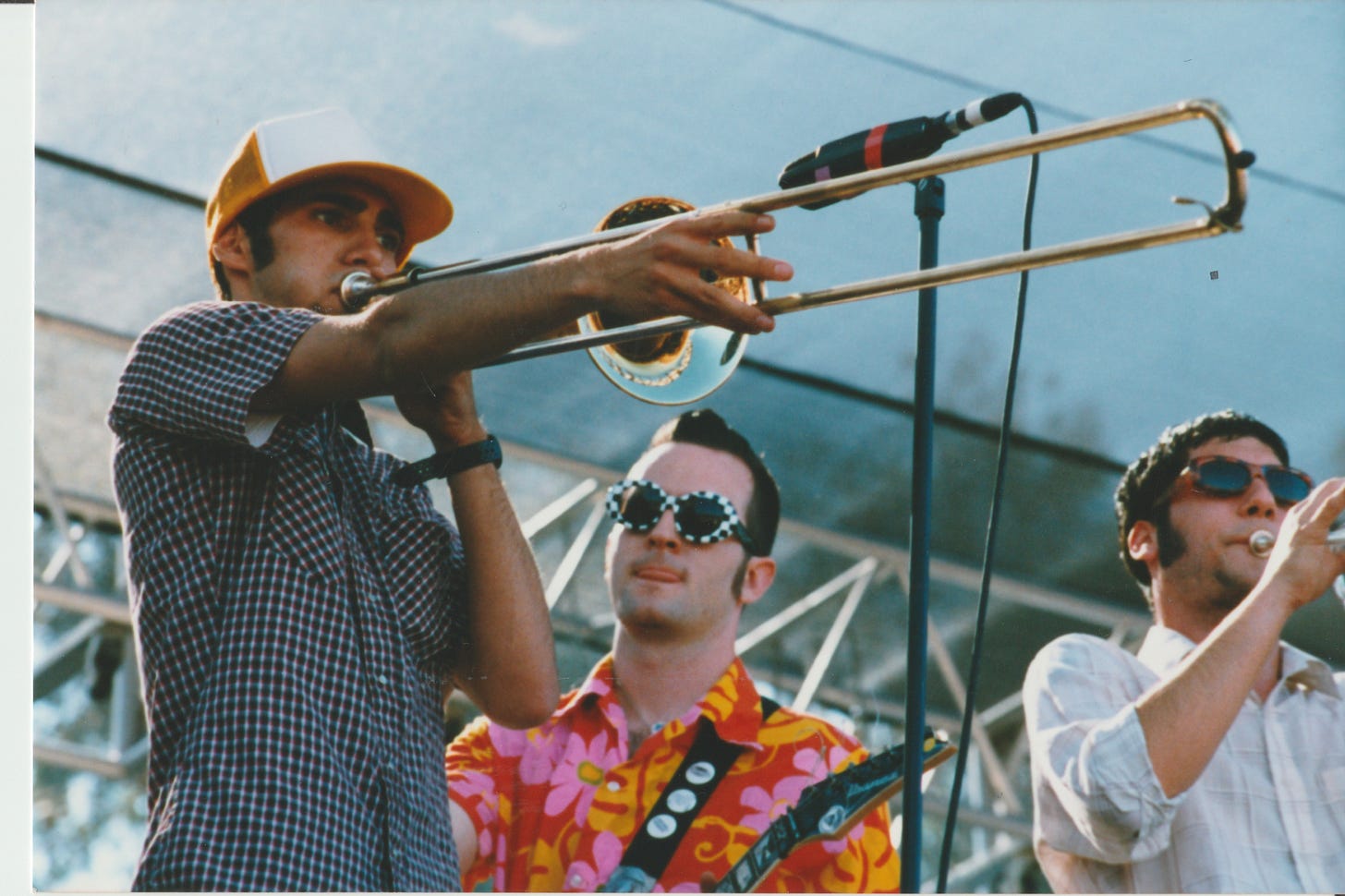Reel Big Fish: The story behind "Sell Out"
Sell Out by Reel Big Fish is not only the ultimate example of radio-friendly ska-punk; it's also quintessential 90s ska. An underground band signs to a major label and then releases their first single, which happens to be about…selling to a major label. How very 90s meta-ironic!
Or was it? Was selling out even the point of the song? Not exactly.
"People found their own meaning in the song. Some thought it was an anthem against selling out. It was really in defense of ska-punk," Reel Big Fish singer/guitarist Aaron Barrett told me.
Specifically, Barrett wrote the song to support Northern California ska band Dance Hall Crashers, one of the first ska bands to score a major label deal in the '90s. Technically, they signed with (510) Records, a newly formed Berkeley-based "joint venture" with MCA, run by Green Day managers Elliot Kahn and Jeff Salzman. (510) Records' focus was to create a higher profile for rock and alternative acts. Dance Hall Crashers was the label's first signing. Their record, Lockjaw, came out in Aug 1995. Shortly after the record was released, (510) Records dissolved, but MCA retained Dance Hall Crashers. MCA proper released their follow-up album, Honey I'm Homely, in 1997.
At the time, Orange County had one of the biggest scenes in the country, and the O.C. kids were an opinionated bunch. They loved DHC's prior album, The Old Record, an early '90 poppy, horn-driven album with many nods to the more traditional ska sound. So, when Dance Hall Crashers released Lockjaw, there was a backlash. That a ska band so dearly loved would dare drop its horn section and sign to a big label worked the O.C. kids up into a furor.
If you enjoy this post, please share it
For DHC, The Old Record was merely a collection from their early years (1989-1992), and by 1995, they'd broken up and reformed, anxious to write new music. And the new music they were feeling favored a twin-guitar, harmony-driven, pop-punk style of ska.
Even though no label told them to change their sound, there was no convincing the O.C. kids. They accused Dance Hall Crashers of selling out.
This chatter of selling out inspired the then-unknown Orange County band—who liked Lockjaw—to write a song poking fun at the scene's self-righteousness. "I was happy to see The Dance Hall Crashers getting some success and radio play," Barrett says of his decision to defend them in "Sell Out."
The opening riff of "Sell Out" even directly rips off Dance Hall Crasher's song "Go" from the Lockjaw record as a wink-wink, though it mostly goes unnoticed. Also, Barrett wasn't flipping burgers like the song claims. He was working at Subway when he quit his job to be a big rock star. "I never flipped one burger. Totally bullshit. It's all lies," Barrett says. "It was too hard to say, 'making sandwiches at Subway.'"
Reel Big Fish signed to Mojo in 1996. The band never pictured themselves singing “Sell Out” on MTV. In fact, it was Mojo's idea to make it the lead single, thinking it'd be hilarious to have a young band debut themselves to the world with a song about selling out, something that so many bands at the time were terrified of being accused of. "It was nice that we had a record label that had a sense of humor," Barrett says. "It's ridiculous to me, watching what happened to the Dance Hall Crashers. I dreamt about getting my band to play in front of as many people as we can. That's all anybody's trying to do."
For more content, sign up for this newsletter
While Reel Big Fish was working on their follow-up album Why Do We Rock So Hard? in late '97, Universal Record's radio department, who had a joint venture deal with Mojo, requested a "no horns" mix of the album. You know, something not quite so ska. "I laughed out loud during the conference call when they asked us for the 'no horn' mix," says Patrick McDowell Jr., Head of A&R at Mojo Records. "One of the things that I enjoyed about working with Reel Big Fish is that they did their own thing. Universal was never into horns. Their radio department always thought we could do better at radio, MTV, and sales if we just got rid of the horns. It was a ridiculous request. It wouldn't be a Reel Big Fish album."
The band declined and released the horn-driven album as intended. Universal might have been right in a sense. Why Do They Rock So Hard? had no hit singles, but it didn't matter; the group's fanbase could care less about what was popular and what wasn't.
"Selling out would be changing your music because the record label told you to, so you can sell more records. We're a horn band. We're going to keep doing it," Barrett says. "Some other bands dropped their horns and made albums that sounded really different. We didn't do that. We were little brats. Fuck You. We do whatever we want. Why would we make music that we don't like?"
Ever since they resisted the temptation to abandon ska, Reel Big Fish has been a ska-punk touring machine with roughly 200-250 shows a year, releasing strictly ska-punk albums while still managing to experiment with the formula. They've never stopped drawing a loyal audience. For fans who found ska in the post-90s years, Reel Big Fish was often their point of entry. Yet, some fans of ska identify Reel Big Fish as the cause for how the '90s ruined ska by making it vapid, pointless, goofball music. However, few are willing to acknowledge that what the band did do was bring a whole new generation to ska music by never selling out their ska roots.




